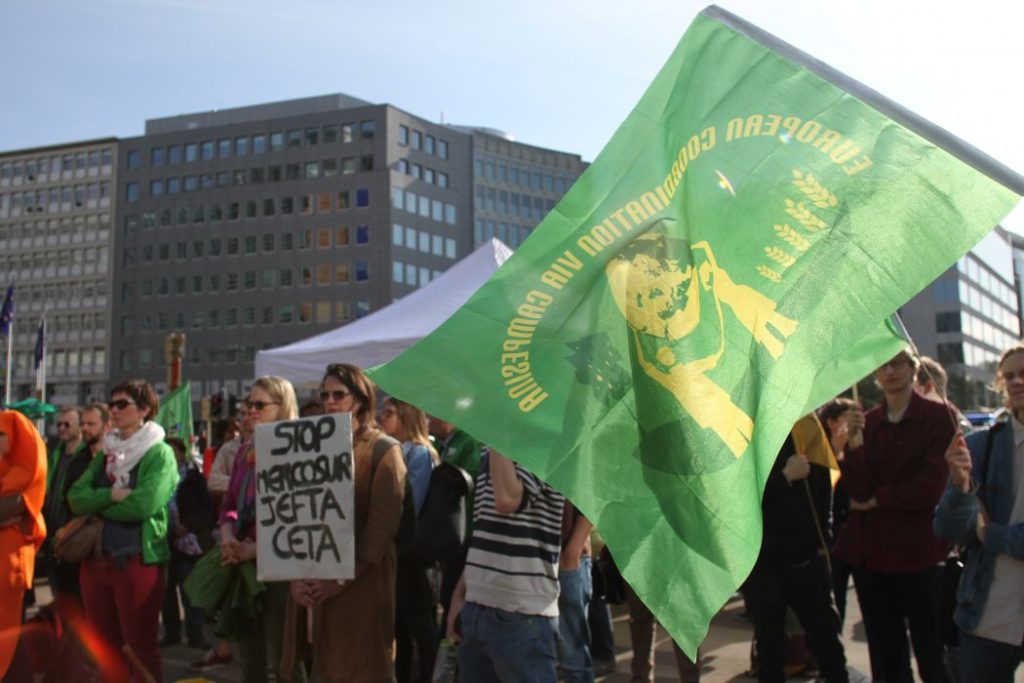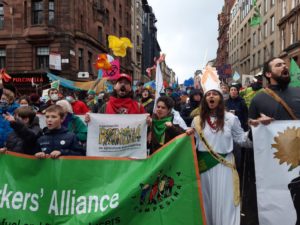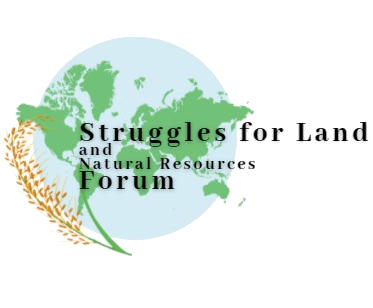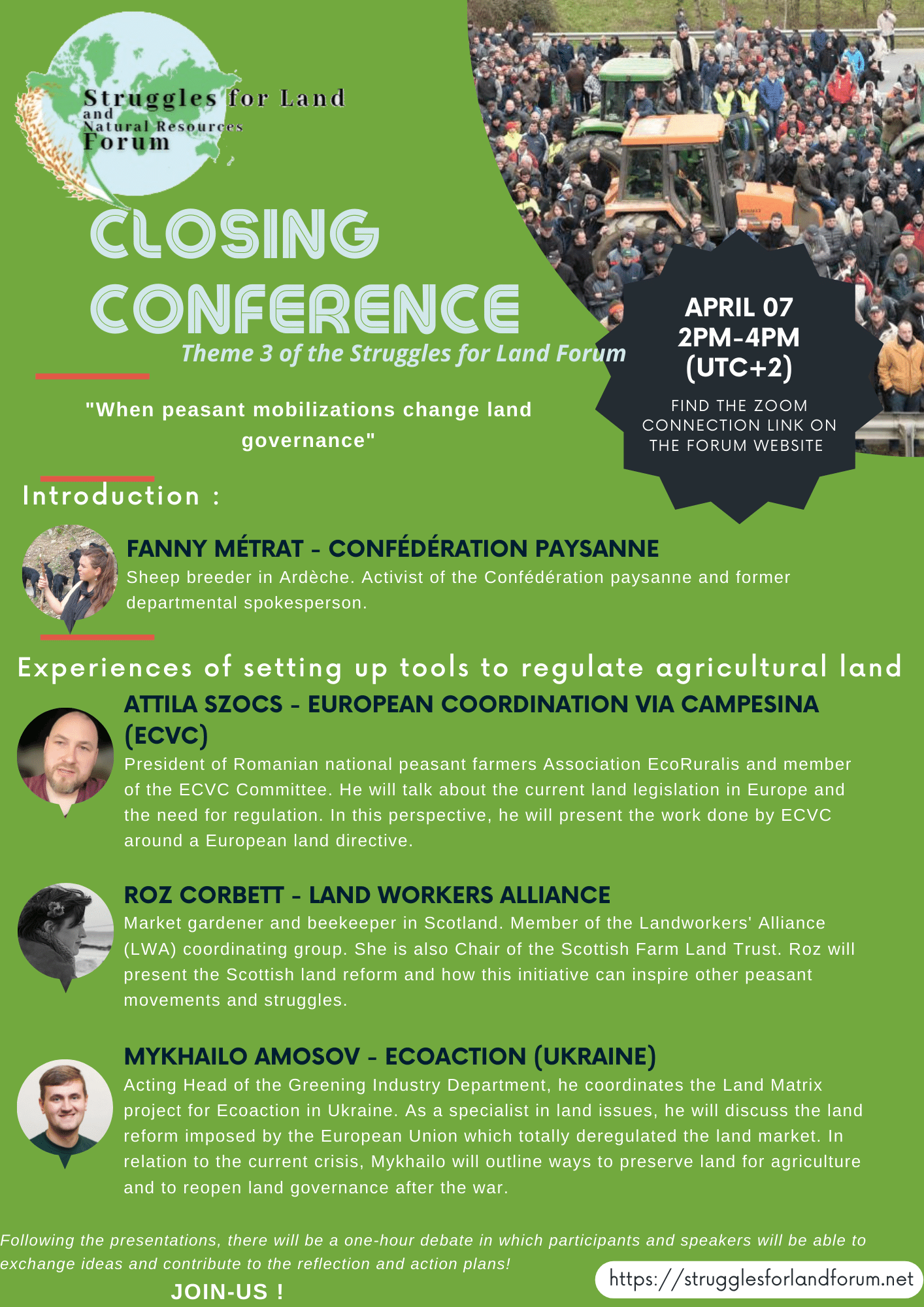
Theme 3: Land struggles: from grassroots mobilisation to legal victories, what strategies?
The third thematic discussion of the Forum of Struggles for Land and Natural Resources took place from March 17 to April 7, 2022. (Re-)watch the opening and closing videoconferences in the "Videoconferencesbelow, and contribute further to this theme in the "Discussion" tab.Discussion" !
There is no need to register. This videoconference will be simultaneously translated into 4 languages: French/English/Spanish and Portuguese.
In recent decades, the European continent has been subjected to a series of factors that have led to the industrialisation of the agricultural system and the commodification of its fundamental component: land, which is considered to be a commodity like any other. In Europe, we are facing two major threats to agricultural land: artificialisation, under the pressure of urbanisation and infrastructure projects; and land grabbing favoured by the enlargement and financialisation of structures, as well as speculation on land prices. The European Union (EU) still does not have a land policy as such. It is the Member States who, at national level, define their own land and landscape policy.

At the national level, land transactions are regulated according to the principle of free movement of persons, goods, services and capital. Attempts to regulate the land market can therefore be hampered by this principle defended by the EU. Yet there is an urgent need to act. Europe is the continent that has lost the most farmers in the last forty years. Land is a common good, worked by farmers to produce food for all. Its preservation and distribution are a major social issue.
European farmers' organisations have constantly mobilised in favour of a fair land policy, promoting access to the use of agricultural land to maintain a European peasantry. There are many examples of mobilisation, and many victories too. However, the trend towards the disappearance of peasants and agricultural land is not abating, due to the lack of legal support for land regulation. Faced with this situation, various EU institutions have taken up the issue, recognising the threat that this legal vacuum poses to the maintenance of peasant farming in Europe. These institutions then asked the European Commission (the most powerful institution in the EU) to create a legal framework for agricultural land, but this proposal had so far remained a dead letter.
This discussion will draw on the experience of the European Coordination of La Via Campesina (ECVC) and its allies. It will present protest mobilisations on the ground to defend and promote an alternative model of governance outside the institutional framework.
But it will also build on its EU-wide mobilisation for a European directive for the governance of agricultural land. A directive is the most powerful legal instrument in the EU. The fundamental objective of ECVC is the implementation of Article 17 of UNDROP (United Nations Declaration on the Rights of Peasants and Other Rural People to Land) as well as the implementation of the VGGT (Voluntary Guidelines for Responsible Governance of Tenure of Land, Fisheries and Forests) at EU level.
Purpose of this discussion
The aim is to present the strategies of European peasant mobilisations in their aspiration for a governance of land that considers agricultural land not as a commodity but as a common good. It is also about presenting how field mobilisations have led to victories in order to place the land issue at the centre of the debate on agricultural policies, and to show how the European peasant movement is becoming a force for legal proposals, thus walking on its own two legs.
If mobilisations on the ground are necessary, they seem to go hand in hand with the construction of an advocacy in order to maintain or create effective regulation tools.
Theme 3: Timeline
- March 17: Launch videoconference
- March 18-April 06: online exchanges and discussions.
- April 07: Closing video conference.
- May 2022: Videos of the videoconferences and summary documents available on the website


EU DIRECTIVE AND PROPOSAL FOR A LAW ORAF Walloon Region to block the sale of land. European directive for land regulation. If I understand correctly, the ECVC proposal is to set a maximum of 500 ha per farmer in Europe, but each country, each region could set more demanding maximum limits. Given that in Belgium, in the Walloon Region, the average farm is about 67 hectares, we propose a law to create a "SAFER à la Belge", (Organisme de régulation des transactions foncières agricoles en Région Wallonne-ORAF RW"), which should always intervene and... Read more "
In my first intervention I tried to expose the importance of the current space occupied by communal lands in Morocco and the recently established laws aiming at the confiscation of 15 million hectares of communal lands. This means the total destruction of the last strongholds of resistance of an ancestral regime among the indigenous Amazigh people. But the question that arises, in relation to the title of the axis of discussion (theme 3), is whether there are struggles of the peasants, to whom the ownership and management of wealth belongs, against the state policy that replaces the common law... Read more "
I am pleased to announce that I have received a letter of intent from the Minister of Agriculture and Rural Development of the Netherlands. I am pleased to announce that I have received a letter of intent from the Minister of Agriculture and Rural Development of the Netherlands, who has been appointed by the Minister of Agriculture and Rural Development of the Netherlands. Means: to regulate the sale of land and the sale of company shares. Do not hesitate to contact me: emmanuelhallard1@gmail.com, vitalasbl@gmail.com. For information in English, please write to us. Peasant Action Movement in Partnership with Vital. Emmanuel Hallard. emmanuelhallard1@gmail.com; eh1971@hotmail.com file:///C:\Users\MEDIAM~1\AppData\Local\Temp\msohtmlclip1\01\clip_image002.jpg file:///C:\Users\MEDIAM~1\AppData\Local\Temp\msohtmlclip1\01\clip_image004.jpg Establishment of a Regulatory Body for... Read more "
Community land tenure is currently the target of the Moroccan state: Pre-colonial history shows that the management of land and wealth in Morocco was in the hands of the communities, which live under the roof of one country but have their own management. Land ownership was collective. It is not subject to any commercial operation, sale or purchase. And all wealth (forests, water, mines, etc.) is shared equitably according to rules based on the principle of consent and on the values of equality and social justice. It was not until 1912, the date of the... Read more "